#60’s guitarists
Text
Uncopyable Jeff Beck, guitar virtuoso from 60’s, dies at 78
Uncopyable Jeff Beck, guitar virtuoso from 60’s, dies at 78
I am so shocked and saddened to hear of the sudden death by bacterial meningitis of one of my fave guitarists since the 60’s, Jeff Beck. I’ve been a fan since he was a lead guitarist in the Yardbirds. Jimmy Page was also a guitarist for the birds.
Jeff went on to form The Jeff Beck group with a relatively unknown Rod Stewart as his lead singer. The album Truth which I still have, is still great.…
View On WordPress
#60’s guitarists#Astrology psychic Tarot card reader Tara Greene#astrology workshops Tara Greene Toronto#car collector#corporate astrology Tarot consultant Tara Greene#influencer#Jeff Beck#Rick Beato#rock guitarist#the Yardbirds#toronto concert#world news
0 notes
Text
i found the daisy jones book soo boring. but i do think like, 60′s/70′s rockers rebelcaptain is a horrifically underrated au. more of that please
#like rogue one is a 60's/70's period drama to start with write that one down#but also there's so so much interesting political content to tap into with this one#i also think that the aldhani heist crew and rogue crew being hastily assembled bands is the funniest thing.#like yeet we broke this chick out of prison#now she's our guitarist
8 notes
·
View notes
Text
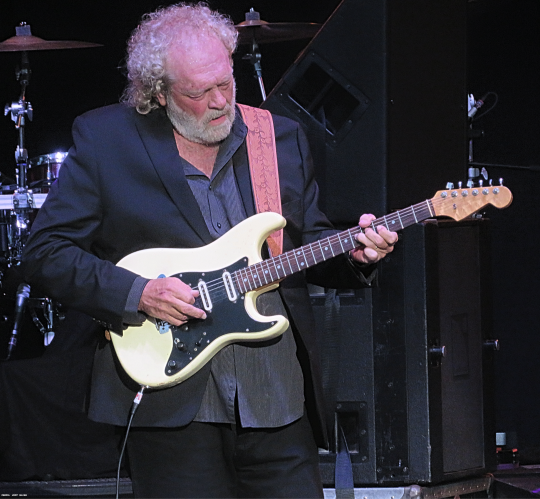
Dustin Hanvey of The Grass Roots - Pacific Amphitheatre; Costa Mesa, CA (8-3-22). #thegrassroots
Photo: Jeff Bliss
#dustin hanvey#the grass roots#pacific amphitheatre#costa mesa#guitarist#musician#music#rock and roll#folk rock#rock shots#rock photography#concert photography#concert#fender stratocaster#guitar solo#60's rock
2 notes
·
View notes
Text
Back On The Street Again
Steve Gillette released his first album in 1967 titled simply “Steve Gillette.” Top-heavy with folk ballads and original songs, I thought the album was a strong debut. Gillette had already established himself as a noteworthy songwriter when Ian and Sylvia, a top Canadian folk duo, included “Darcy Farrow,” a song Gillette co-wrote, on their 1966 album “Early Morning Rain.”
I still own Gillette’s…

View On WordPress
#60&039;s music#70&039;s music#concert performer#Greenwich village#guitarist#Martin guitar#music business#music cafe#music clubs#musicians#performers#solo guitar#songwriter#stardom#success#talent#The Bitter End#touring#vocals
0 notes
Note
Current fugure Richard.. I don't want to call him chubby because he's not, he just lost muscle mass and got rounder midsection.. anyway, he has absolutely no idea how hot his current body is.
Sure, he was absolutely stunning when he was ripped, but this so called dad bod.. unreal! Unreal!! It's such a fucking turn on when men, especially his age, look like that. Can you imagine sitting and bouncing on top of that? Jfc!!!
He is fit as fuck and everyone else is wrong! YOU HEAR ME KRUSPE? FIT AS FUCK!!!
Hi 😌
I really swear, even if it seems like it, I did not ghostwrite this post....
It would be futile to try to describe how much Richard is my type in his current state - I can hardly put into words how incredibly attractive his slightly more chunky physique is to me, and apparently some other people, too 👀 And he has offered us so many impecable looks in the past few years!
Such a transformation from a boyfriend material/90's dream boy:


to a well-trained dream of a silver god guitarist:


to a freaking vampire (I'm fine, I'm fine, it's not like this era is a fantasy come true to me, nope):


to an absolute picture book rockstar who is not afraid to flaunt his...all, actually:


to his current look, a little more on the ribs, wonderful voluptuous curves and yet incredibly masculine. While others may not relate to this sentiment, for me this is an absolute dream. I can't even describe it, he just looks so... kneadable, cuddly, yet so manly? Man, I don't even know:




He may not be as ripped anymore, and this is a good thing. Richard is pushing 60, it's only natural that his physique is undergoing changes. And yet he looks so incredibly attractive! I think there's also a lot of self-confidence involved and how he carries himself, to have this mesmerizing effect on us 😌 Regarding the 'fit' part: I think it's safe to say that Richard is still keeping fit with sport, yoga and similar activities, since for example going to the gym or running seems to be a vital part of his daily routine - at least he mentioned it in some interviews a few years ago (for example here and here).
Here I've answered another ask a while ago with a little closer look at Richard's 'evolution':
So in conclusion, me looking at Richard at all times, but especially in this current era:

#rammstein#richard kruspe#ask#yet another thirsty ask and thirsty answer on my blog. shocking#he really IS unreal#btw yes i do love pulp fiction and use every chance i get to insert some gifs of it somewhere
57 notes
·
View notes
Note
I KNOW that you are a specifically Till acc, but do you have any facts on his bandmates? (If not That’s okay love your blog)
Hi ! Thanks for the ask, I tried to gather all the facts I could think of but I probably forgot quite a few (feel free to add to this list if you feel like it !) :
— Richard did a lot of odd jobs when he was young (shoe salesman, cook, etc.) but the job that made the biggest impression on him was as a cleaner for an old lady who had stuffed her poodles. She made him run a feather duster over her poodles ;
— Richard bought his first album in Hungary for 200 marks. It was the album Plastic Surgery Disaster by Dead Kennedys ;
— Rammstein and Depeche Mode got into a tomato fight in the backstage at the 2001 MTV Europe Music Awards.
— Richard bought his first guitar at the age of 16 in Czechoslovakia, not because he knew how to play, but to sell it back in Germany. On the road, he (and some friends) stopped at a campsite and a girl insisted he play, so he strummed the strings. And it was because girls liked guitarists that he became one himself ;
— Paul said that every time Till went to Leipzig, he went to his grandmother's and ate pasta ;
— Paul thinks he might have been a psychic or psychiatrist, Schneider thinks he might have been a computer scientist and Ollie a masson ;
— Paul thinks that if the band were stranded on a desert island, they'd eat Till first, but they'd have to wait until he fell asleep because he probably wouldn't let them. And the worst thing is that Till agrees with it because, when asked the same question, he replied that the group would eat him first because he has more meat than the others...;
— Flake and Paul, along with Feeling B and others, turned Till's house upside down, smashed tables, turned up the music and cooked fried eggs with honey because they couldn't get their hands on the butter ;
— Paul says that if he had to invent an object, it would be a plate that keeps the heat in, because according to him, the dishes are always too hot, so he waits and then they quickly become too cold ;
— Richard and Flake, during the recording of Reise Reise, got into a verbal joust : Richard said that Flake's wife "sang like a cuckoo", and Flake informed Richard that nobody cared about his children's talents ;
— Richard grabbed Till's collar and slammed him against a wall because Till made a joke about Richard's unconditional love of Donald Duck movies. Till repeated this in an interview (with Richard and Ollie) in 2006, to which Richard replied: "Idiot ! I’m a fan of Italian realism from the early 60′s. Alberto Sordi, Fellini... I’m not a snob but unlike these gloomy guys I know cinema well." ;
— Flake told Paul he couldn't be racist because he didn't like anybody ;
— Schneider and Till have gardening competitions, but Till is jealous because Schneider always has the most beautiful orchids ;
— Till sent a huge box of candy with the note "Enjoy the fucking candy" to Chris Martin (Coldplay) to thank him for helping him with a sore neck. Since then, they've been friends, and Chris dedicated a Coldplay song to Till and his children during a concert ;
— Schneider's mother was angry with him because of the Mutter song, but he didn't understand why, he just told her that he didn't write the lyrics ;
— Ollie accidentally hit Till on the head with his bass, Till had to leave the stage and be bandaged, he ended the concert with a huge bandage ;
— Ollie once stole something. It only happened once. It was a little wooden boat, and when he got home he felt so guilty that he confessed the whole thing to his mother ;
160 notes
·
View notes
Text
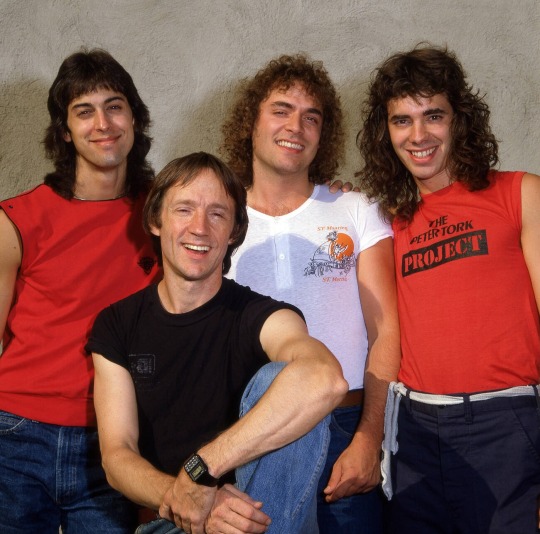
The Peter Tork Project. Photo by Michael Ventura.
Though I posted the photo previously (also with the watermarks removed), it's the only color photo of The Peter Tork Project that I know to be available online... so, here's a concert review to accompany it this time around:
“During the performance by THE PETER TORK PROJECT last Friday night at Patrix, there was a phalanx (yes, that is the proper word) of Monkees fans behind me who kept shouting, ‘DO MORE MONKEES SONGS!’ […]
I really wished the Monkees fans would have shut up.
[…] The PETER TORK PROJECT’s new material is strong enough to stand by itself.
If nothing else, it’s certainly different from The Monkees. Tork shows that his brain hasn’t been going soft in the years since he left the Monkees in 1969. He delivered his self-penned ‘U.S. Out of El Salvador’ (No draft no war U.S. out of El Salvador) with chant-like vocals reminiscent of a folkier Clash. […]
Though his patter between songs is still silly and self-deprecating, there’s a serious undertone to a lot of his material, to go with the added wrinkles on his face. He introduced one of his songs with ‘Here’s a song about life in the breakdown lane. You’ve heard about the fast lane. Well, this is what comes after that.’
The song was quite moving, definitely, I would venture, autobiographical. […]
Tork allowed the other band members to write their own material and do lead vocals on their individual songs, which is a refreshing blast of modesty from someone as famous as Tork. The band, as musicians, are just superb. Jerry Renino is a solid, supportive bassist, Derek Lord is a tight, showy drummer, and Scott Avitabile embodies the best of 60’s guitarists of the Black Sabbath variety to 70’s guitarist of the Van Halen variety. […]
THE PETER TORK PROJECT’s best original songs sound like [Neil] Young’s brilliant work from the mid-70’s with the band Crazy Horse. The songs have the same mellow, folkie vocals juxtaposed with crunching, almost heavy metal-like guitar playing.” - Bill Dale-Marcinko reviews The Peter Tork Project’s concert, The Central New Jersey Home News, September 29, 1983
#Peter Tork#Tork quotes#80s Tork#Tork reviews#The Peter Tork Project#Jerry Renino#Derek Lord#Scott Avitabile#long read#Tork songs#Tender Is#Tork performances#can you queue it
21 notes
·
View notes
Text
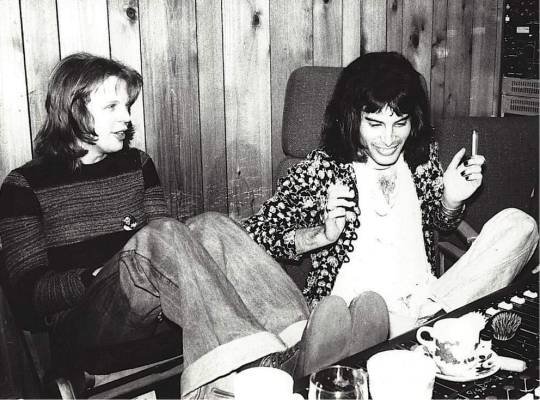
Today - March 5th, 1976
Eddie Howell "The Man From Manhattan" 7" single released
Freddie Mercury: producer/piano/bvs
Brian May: guitar
Excerpts from an interview
Jacky Gunn-Smith - Official International Queen Fan Club
Eddie Howell’s ‘Man From Manhattan‘ is one of the best known and best loved of all Queen’s collaborations.
Recorded in mid January 1976 at Sarm East Studios in London, the song was produced by Freddie Mercury, who also played piano and sang backing vocals on the track and featured Brian May on guitar. The record is so reminiscent of “A Night At The Opera” in both instrumentation and mood, that many fans regard it as virtually an “Opera” out-take. When it was launched as a single on Warner Bros records in 1976, it became a turntable hit in the UK and looked set to chart until music industry bureaucracy halted it in it’s tracks.
Birmingham born Eddie Howell began his professional career in the late 60’s, when Chrysalis music picked up on his songwriting demos and introduced him to an independent record producer, who in turn licensed his first single “Easy Street”, as a one-off deal to Parlophone in 1969.
Working as a songwriter throughout the early 70’s, Eddie’s next venture into recording came in 1975 when he signed to Warner Bros records as an artist. thursdaysHe released two singles, “Long Story” and “Can’t get over you”, and his debut LP “The Eddie Howell Gramophone Record”, which featured members of “Brand X” and guitarist Gary Moore.
The album was launched at a promotional gig at Thursday’s club in Kensington. Eddie’s band included Phil Collins on congas, Jack Lancaster on saxophone and Robin Lumley on keyboards. Explains Eddie, ”In the audience that night was Freddie Mercury who had been brought along to the gig by my manager David Minns. It was there that he first heard “Man From Manhattan”, which was a newly written song included in the set. After the gig we met and he was very complimentary about the song and offered to produce it. I remember we all went down to ‘The Elephant on the River’ to celebrate”.
Enthused by the prospect of his first foray into production, Freddie wasted little time in getting started. ”I gave him a two track guitar/vocal demo of the song” recalls Eddie, ”and a couple of days later he called and said let’s get going. Studio time was booked at Sarm East Studios and true to form, Freddie quickly took control of the sessions; ”He did lots of pre-production work on the song’s structure and the harmony arrangements”, reveals Ed. ” He had a mini cassette recorder loaded with ideas for the track, backing vocals and answering phrases”.
”We took a week to record the song”, remembers Eddie, ”which was a long time in those days, but because of Freddie’s involvement, Warners gave us a blank cheque. The sessions were quite intense, there was never a lull. Brian came in to play hismikestone2 guitar parts and the musical rapport between him and Freddie was plain to see, they were on the same page. One day, a hand-held spinning bell-cymbal in the key of ‘D’ was required by Freddie for one ping at the end of the track and the studio didn’t have one, so a runner was dispatched to scour the streets of London in search of one. The session was adjourned for half a day while we waited down at the Shazam Indian restaurant in Brick Lane for the bell to arrive. It eventually arrived and took about a minute to record, it must have been the most expensive ping ever recorded”.
On the final day of recording, a trio of Warner Bros top brass flew in from California and made a beeline for Sarm East studios to meet Freddie. Recalls Eddie, ”They probably thought the red carpet would be rolled out as they were paying for the recording sessions, but instead they were kept waiting in reception for about four hours. When they were eventually granted an audience, the charm offensive was full onlongstory3 and it was all smiles and bonhomie. At the end of the session, after the final playback, Freddie turned to me and said, ‘If this isn’t a hit, sue Warner Bros ‘ ”.
The finished article obviously had a heavy Queen influence with the presence of Freddie and Brian on the track, but ”Man from Manhattan” was far from a tribute to Queen. ”I wrote the song after my first trip to Manhattan in late 74”, reveals Eddie, ”I was reading ‘The Godfather Papers’ by Mario Puzo and the song was about those mafia characters who lead a double life. Musically, I had ‘Dead End Street’, by the Kinks in mind, complete with trombones and a walking double-bass”.
Prior to the ban, ”Manhattan” made top 50 in the UK, top 20 in Australia, Belgium and South Africa and top 5 in Holland, but sadly, as a consequence of the ban, it was never released in America or many of the world’s other major territories.
When it was issued as a single in 1976, Warner’s publicity department played up the Queen connection as much as they could, and “Manhattan” rapidly became a turntable hit in the UK. The record received heavy rotation on the airwaves – particularly in Europe where it became a big hit. Then, just when it looked set to climb the charts in the UK, the Musicians Union mysteriously discovered that Jerome Rimson, the American bassist hired by Freddie for the sessions, had been working in Britain without a permit. This obliged them to place a ban on any and all further UK media exposure due to his ‘Illegally’ recorded playing. A decision which effectively killed off the record.
Having recently regained the rights to his back catalogue recorded during his time with the label, Eddie is now releasing the tracks digitally. ”Man from Manhattan” is first up, more to follow…
(source: https://manfrommanhattan.wordpress.com/)
📸 Pic: Freddie Mercury and Eddie Howell in control room
#man fron manhattan#eddie howell#1975#zanzibar#legend#queen#brian may#john deacon#freddiebulsara#london#queen band#freddie mercury#roger taylor
30 notes
·
View notes
Text
327: XTC // Black Sea
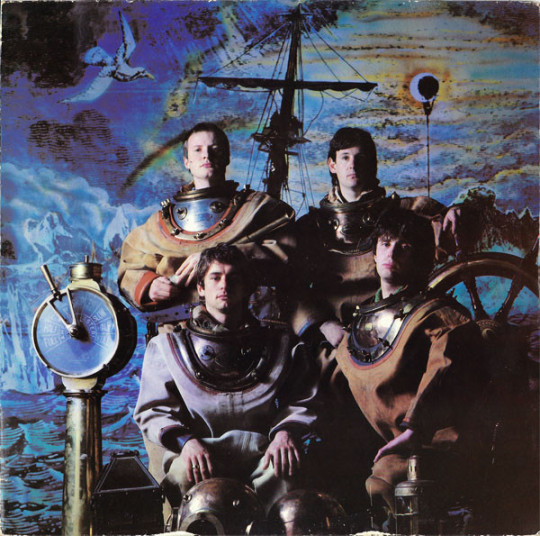
Black Sea
XTC
1980, Virgin
XTC’s discography has a very organic flow to it. Andy and Colin’s voices aside, it’d be tough to guess the same band was behind the albums that bookended their career (convulsive 1978 New Wave speedball White Music and the lavishly arranged psych pop of the turn of the century Apple Venus tandem), but if you follow the band over time, from one album to the next there are few radical departures. Each link in the chain contains elements of the record that precedes it and the one that follows it. Still, you can clearly divide their discography between their early years as a hard-touring New Wave act and their second act as a pastoral psych pop studio project—and, in that light, the albums that straddle that transition (today’s album, Black Sea, and 1982’s English Settlement) could be considered the “definitive” XTC records.
youtube
It’s easy to forget what a spectacular live act XTC were in their early days, something like a combination of ‘60s bubblegum, Devo, the Residents, and Wire, but with cardio that would’ve put most of those acts to shame. As a guitarist, Andy Partridge scorned anything that smacked of blues, slashing out hiccupy riffs way up the neck, hurling himself into head-spinning rhythms that often wouldn’t be out of place on a Fugazi record (if he didn’t have such a sweet tooth). He surrounded himself with collaborators whose ability as players was such that they were able to make their own marks on the band’s sound despite Partridge’s dictatorial tendencies—not only minority songwriter and exceptionally melodic bassist Colin Moulding, but ultimate utility man Dave Gregory (who flitted with ease from lead guitar to keys) and their gem of a drummer Terry Chambers, a non-writing / arranging member who would be lost when the band’s studio transition reduced him to a glorified session man. Chambers was an absolute machine, and many of the band’s most memorable early statements rely on his power and precision behind the kit.
Black Sea is their last record to be dominated by the quirky sound-over-sense rhythm workouts on which they built their name, and they go out with a bang: “Rocket from a Bottle,” “Burning with Optimism’s Flames,” and especially “Paper and Iron (Notes and Coins)” are fine reminders that new wave was as much Body as Head music, while the tribal stomp of “Travels in Nihilon” feels like a hint at what XTC would’ve sounded like as some kind of Swindon krautrock band. But the songs that are best remembered from this one are those first stirrings of their burgeoning reinvention as basically the attention deficit disorder Kinks.
By his own admission, Colin Moulding’s early songwriting efforts had aped Partridge’s style, but here it seems Partridge was inspired by Moulding’s sardonic kitchen sink satire “Making Plans for Nigel” (from the previous year's Drums and Wires). “Respectable Street” reads almost like Partridge proving to himself he can write his own “Nigel,” while the chiming psychedelic pop of “Towers of London” scales its social commentary to the Empire itself. His finest moment though is “No Language in Our Lungs,” one of the band’s first genuinely emotional statements. The wordy lyric is typically “clever” (“I would have made this instrumental / but the words got in the way”) yet it captures the feeling of being overwhelmed by the intensity of…well, a feeling. The credit lies mostly with its arrangement, which heaves and stumbles behind Andy’s inconsolable howl like someone dragging their feet in exhaustion.
youtube
Black Sea usually sits somewhere between third and fifth in my personal XTC rankings, but it’d be the place I recommend a new fan start with the band (or would be, were the record available on streaming services). Between Andy’s peculiar voice and a smartass quality that can get a little cloying, XTC’s not for everyone—but for those on the wavelength, their catalogue is one of the greatest of the rock era.
320/365
Bonus
For the hell of it, my personal XTC discog rankings.
Skylarking
English Settlement
Black Sea
White Music
Drums and Wires
Apple Venus Volume 1
Go 2
Wasp Star (Apple Venus Volume 2)
Oranges & Lemons
Mummer
Nonsuch
The Big Express
#xtc#xtc band#andy partridge#colin moulding#virgin records#new wave#art rock#post punk#psych pop#'80s music#music review#vinyl record
20 notes
·
View notes
Text
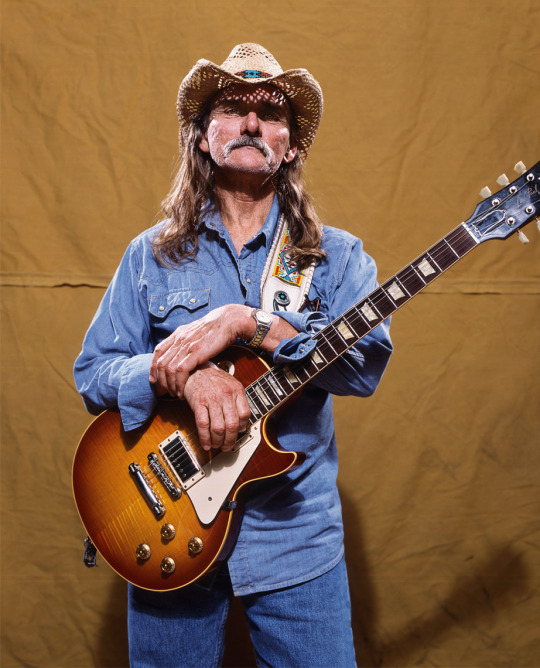
Dickey Betts
Guitarist, singer and founding member of the Allman Brothers Band best known for writing their 1973 hit Ramblin’ Man
Dickey Betts, who has died aged 80, was a founder member of the Allman Brothers Band, one of the most influential US “southern rock” groups of the 1970s. The hard-living outfit blazed out of Jacksonville, Florida, in 1969 with a mix of rock, blues, country and jazz that defined the genre, also influencing artists such as Lynyrd Skynyrd, ZZ Top, the Black Crowes and Kid Rock. They scored several platinum and gold albums and were inducted into the Rock & Roll Hall of Fame.
Although the six-piece band was ostensibly led by the blond- haired Allman brothers, Duane and Gregg (guitar and keyboards/vocals respectively), as joint lead guitarist, singer and main songwriter Betts played a crucial role. A larger than life character with his cowboy hats, long moustache and gunslinger good looks, Betts wrote many of the band’s best loved songs, including Jessica, Blue Sky and the 1973 US No 2 smash Ramblin’ Man, inspired by life on the road.
The signature duelling of Betts’s and Duane Allman’s lead guitars rewrote the rule book of how twin guitarists play together - previously one had played lead and the other rhythm. The band’s huge fanbase included President Jimmy Carter, and in 2020 Betts even received the rare accolade of a mention in a Bob Dylan song, when Murder Most Foul contained the line “Play Oscar Peterson, play Stan Getz/Play Blue Sky, play Dickey Betts.”
He was also the inspiration for the rock star character played by Billy Crudup in the former rock journalist Cameron Crowe’s film Almost Famous (2000), the director having been drawn to Betts’s aura of “possible danger and playful recklessness behind his eyes”.
Betts was born in West Palm Beach, Florida, one of the three children of Harold, a carpenter, and his wife, Sarah (nee Brinson), who wrote poetry and played the cornet in a Salvation Army band. Although his father was also a keen fiddler, Dickey’s first instrument was the ukelele, which he started playing aged five, later graduating to the mandolin and the banjo.
He was at West Gate elementary school when he wrote his first song, Seven Years With Pamela, about his sister. He then attended various West Palm Beach schools until seventh grade, dropping out of high school when he was 16, by which time his pursuits included carpentry, hunting and listening to the Grand Ole Opry on the family radio.
Hearing Chuck Berry’s Maybellene in his mid-teens prompted another switch of instrument, as he “started realising that girls like guitars”. He dropped out of high school aged 16 to tour the US with a travelling circus in his first band, the Swinging Saints, but was playing in Second Coming with the bassist Berry Oakley when Duane Allman invited both men to join his new group.
The lineup was completed by the drummer Butch Trucks and – unusually in white-dominated 60s southern rock - a black second drummer, James Lee Johnson, who had previously played with Otis Redding and Percy Sledge.
Although sales of their first two albums were sluggish, Duane Allman’s appearance on Eric Clapton’s 1970 album Layla and Other Assorted Love Songs – which included the classic hit Layla – boosted the heavy-touring Allman Brothers Band’s rising profile. Their 1971 live album At Fillmore East sold 1m copies.
After Duane Allman and Oakley were killed in motorcycle accidents in 1971 and 1972 respectively, Betts led a rejigged lineup. The 1973 album Brothers and Sisters – featuring Ramblin’ Man and the instrumental Jessica, later the theme to the television motoring show Top Gear – topped the US charts for five weeks, while 1975’s Win, Lose Or Draw went into the Top five. By then the band were succumbing to a familiar music industry cocktail of success, drugs, alcohol and feuding.
Betts and Gregg Allman both made solo albums, before Betts felt betrayed when the latter testified against the band’s road manager in a 1976 drugs case and refused to work with him again. Nevertheless, they regrouped in 1978, splitting again in 1982.
A second comeback in 1989 proved more enduring, although in 2000 Betts was fired over his drinking. That third spell in the band had been dogged by alcohol and drug abuse, lawsuits and arrests, and in 1996 he was charged with aggravated domestic assault after pointing a handgun at his fifth wife, Donna (nee Stearns), whom he had married in 1989. The charges were dropped after Betts agreed to enter rehab.
In his later years he returned with his own Dickey Betts Band and played in the band Great Southern with his son Duane. True to his ramblin’ man credentials, he remained on the road to the last, even after brain surgery following a 2018 fall at home, and he released live albums well into his 70s.
He is survived by Donna and his children, Kimberly, Christy, Jessica and Duane.
🔔 Forrest Richard Betts, musician, singer and songwriter, born 12 December 1943; died 18 April 2024
Daily inspiration. Discover more photos at Just for Books…?
13 notes
·
View notes
Text
youtube
“Rebel ‘Rouser” by Duane Eddy, who died last week, age 86, is one of those monumental late-‘50s/early-‘60s guitar-driven instrumental hits that, like “Rumble” and “Walk Don’t Run,” got a ton of kids dancing and a bunch of others picking up guitars and starting bands.
Eddy is cited by a stack of big-name artists as a formative influence. His sound craved even by such pop outsiders as Art of Noise, who teamed with him for a revision of his hit “Peter Gunn.”
youtube
A video that owes not a little to the “Girl Hunt Ballet” in 1953’s The Band Wagon.
youtube
Eddy’s twangy guitar is likely to continue impelling guitarists to crank the reverb up on their amps.
aav.
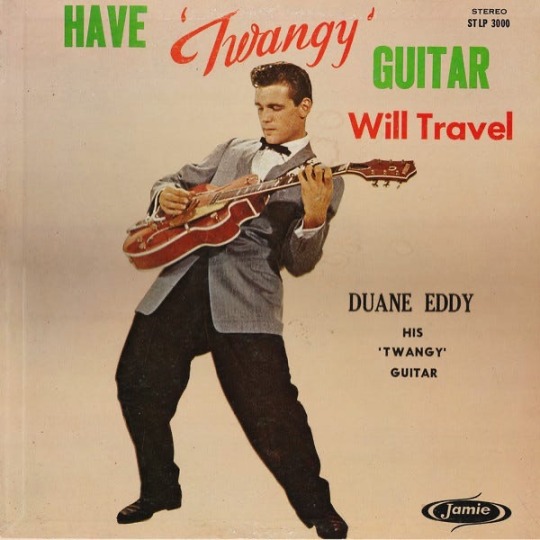
#duane eddy#rock’n’roll#instrumentals#obituary#art of noise#fred astaire#cyd charisse#music video#‘50s rock#Youtube
10 notes
·
View notes
Text
Jimmy Page and the Rolling Stones: 60 years of musical flirtations
Certainly, not all blues enthusiasts of the early 1960’s can claim to have become some of the most influential musical artists of all time. But that’s one thing that Jimmy Page and the members of the Rolling Stones have in common.

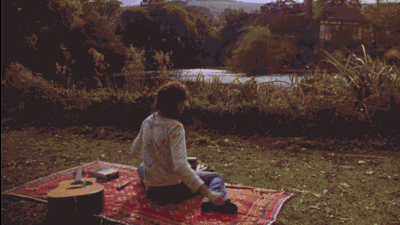
The first encounter between Mick Jagger, Keith Richards and Jimmy Page occured in 1962, just a few months before the formation of the Stones. The three English boys travelled all the way from the South to attend UK’s first American Folk Blues Festival in the city of Manchester. They met at a blues collector’s house, and together they listened to Howlin’ Wolf’s masterpiece album commonly known as ‘Rocking Chair’—then newly released. For a blues fanatic back then, meeting someone with the same interest was something almost extraordinary. Most people weren’t interested in what was still a rather obscure music genre and preferred rocking and rolling to the songs on the radio. For this reason, if you liked the blues and met someone alike, you were going to remember them.
By the end of the same year, Jimmy was spotted during a gig at the Marquee Club in London and asked to play regularly on record sessions. This was the start of a short but prolific career as a session musician for the young man, who would soon encounter Mick and Keith again, this time with the rest of the Rolling Stones. He played on a number of demos for the band, three of which were officially released on Stones records:
These sessions were a great opportunity for Page to develop an understanding of how records were produced: he spent hours in the control room, and soon he was employed as house producer and arranger at Andrew Oldham’s Immediate Records. In 1968, the record company released Blues Anytime Vol 1-2-3, a series of records containing works by various British blues artists. Jimmy featured in two of these, producing a few songs on which Mick Jagger (harmonica), Bill Wyman (bass), Ian Stewart (piano) and Eric Clapton (guitar) were the musicians.
Around this time, Jimmy also gave a helping hand to Brian Jones on the soundtrack for the cult classic movie A Degree of Murder (recorded late 1966-early 1967), also using his now notorious trick of the violin bow. He recalls:
“Brian knew what he was doing. It was quite beautiful. Some of it was made up at the time; some of it was stuff I was augmenting with him. I was definitely playing with the violin bow. Brian had this guitar that had a volume pedal – he could get gunshots with it. There was a Mellotron there. He was moving forward with ideas.”
—Jimmy Page, from issue #1171 of Rolling Stone
Legend has it that the Stones had previously asked Page to join the band in order to throw Jones out, but he declined.
The group was again looking for a guitarist in late 1974, to fill the spot left by Mick Taylor’s sudden goodbye. Jimmy had recently jammed in the studio with them on a fun session which birthed the track Scarlet, but it was highly unlikely that he would leave the then biggest band in the world—even for the Rolling Stones. The track remained in the vaults for 46 years, and was finally released in 2020 as part of the expanded edition of Goats Heads Soup.
“I had completely forgotten about it. Someone told me it was Ginger Baker on drums. And I rang Jimmy Page up — I didn’t remember anything — and Jimmy Page remembered everything! This person played on it, it wasn’t Ginger Baker … he seemed so certain about it.”
— Mick Jagger on The Zoe Ball Breakfast Show, July 22, 2020
Jimmy Page and the Rolling Stones would cross paths again in September 1983 when both Jimmy and Bill Wyman played on the ARMS Charity Concert, later embarking on an American tour with the rest of the musicians involved.
As a result of this, several of said musicians were invited to take part of Wyman’s latest project, Willie and the Poor Boys. Inspired by the music of the early 1950’s, they congregated at Jimmy Page’s home studio, the Sol, and recorded numerous tracks, twelve of which were officially released on a 1985 self-titled album. Jimmy can be heard on two of them:
The Eighties were a time of turmoil for the Rolling Stones as its two principal songwriters, Richards and Jagger, had been feuding over the band’s direction for most of the decade. Nonetheless, right after the Willie and the Poor Boys sessions commenced the recording process for Dirty Work. Jimmy took part of another jam session with the band, immortalised on the hit single One Hit (To The Body).
In 1992, the 7th annual Rock and Roll Hall of Fame took place, and among the chosen legends to be honoured that year were the members of the Yardbirds. Keith Richards also attended the ceremony, being assigned the role to induct Leo Fender, one of his idols and legendary creator of the Fender Stratocaster. Later on, an All-Star Band was formed for a one-off performance and Keith and Jimmy found themselves merrily jamming together once again on classics such as ‘Green Onions’, ‘Soul Man’, ‘Big River’, ‘Dust My Broom’, ‘Shout’, ‘All Along the Watch Tower’, ‘Purple Haze’ and ‘Something Is Wrong With My Baby’.
After sharing much of their success over the past six decades, Jimmy Page and the members of the Stones remain close friends, now having earned a well deserved title as rock and roll legends.
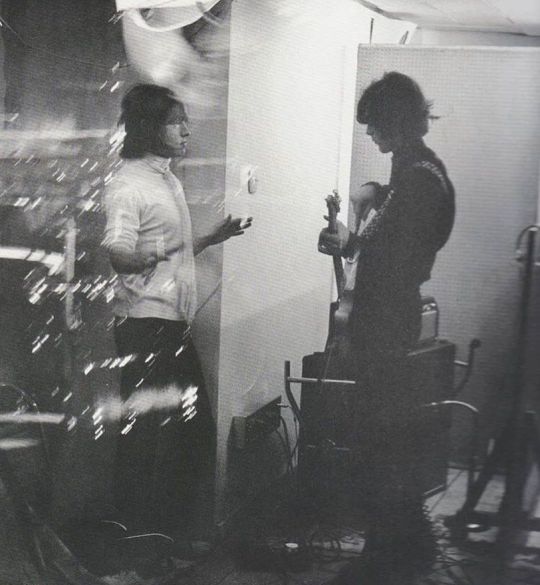

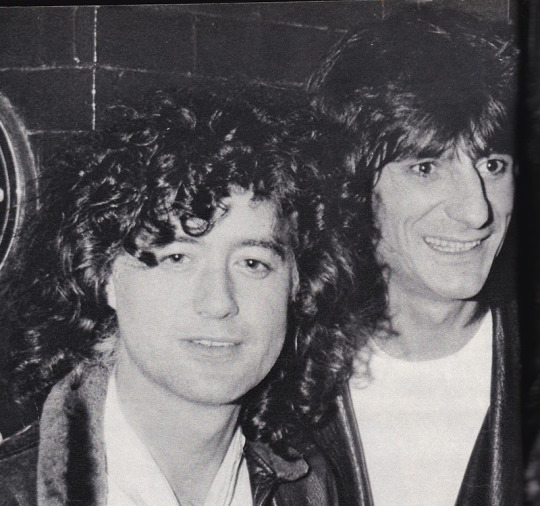



#new little article!#jimmy and the stones are some of my fave artists ever and the fact that they've collabed many times makes me so happy 🥰!!#jimmy page#the rolling stones#rolling stones#led zeppelin#mick jagger#keith richards#brian jones#ronnie wood#mick taylor#charlie watts#classic rock#rock#70s rock#blues rock#rock and roll#rock n roll#rock music#discover jp#by dee dee 🌺🕯️#my writing
135 notes
·
View notes
Text




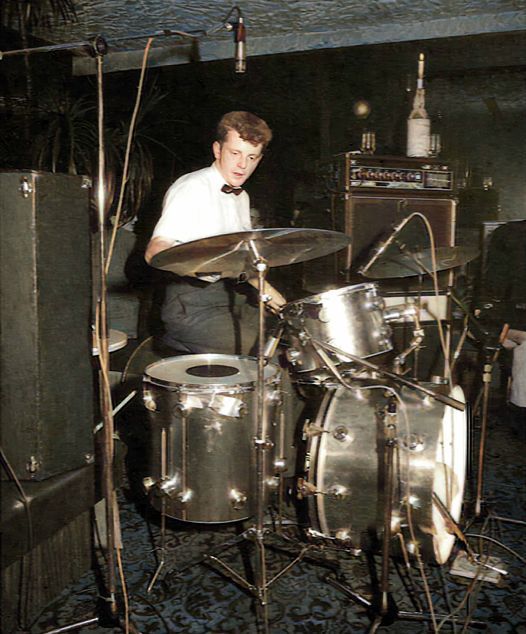
The Subway Sect Mark II shattered after performing their Club Left 'Songs For Sale' set in Paris in 1981 as captured by Sarah Partridge (photo no.1).
So what did punks do after the early days of filth and fury?
By ’78, the early UK punk scene was already fracturing: after the Pistols crashed & burned, a fraternity of post punk musicians attempted to break from punk clichés and experiment with non-rock styles, Crass declared that punk was dead, as did Pete Shelley with Buzzcocks entering their pop punk formative phase while street punk and Oi! Bands attempted to redefine punk.
Vic Godard was there right from the very start, since his Subway Sect were among the performers at the legendary 100 Club ’76 Punk Festival sharing the bill with Siouxsie & the Banshees, The Clash and the Sex Pistols.
theguardian.com/ : “Vic, in league with Bernie Rhodes, was thinking of an even more shocking revolt against conventional taste: cocktail jazz. Rhodes persuaded Godard to ditch the original Sect and hired a fresh group of musicians with a little more swing than the original band. One of the first public expressions of this was Club Left, a regular night that ran at the Whisky a Go Go in Soho as the ‘80s began. The idea was to annoy everyone. But this sonic handbrake turn went on to point a lot of music – and a lot of punks – in a very different direction.”
The Clash’s manager Bernard Rhodes recruited keyboardist Dave Collard (photo no.2 by Coneyl Jay), bassist Chris Bostock (photo no.3 by Ian Usher), guitarist Rob Marche (photo no.4) and drummer Sean McLusky (photo no.5), key members of various Bristol groups, who along with Vic Godard formed a new incarnation of Subway Sect with a completely different sound influenced by ’40s-style crooner music mixed with jazz, soul, rockabilly and skiffle, which was referred to as ‘Cool Bop and Swing’. These cool cats, a London ‘Rat Pack’ with Johnny Britton as the regular Club Left DJ, even toured extensively and their refined set became the “Songs for Sale” album.
“I remember looking down from the club’s floor-to-ceiling window one night just before opening, and seeing a queue stretching round the corner into Shaftesbury Avenue. We attracted an amazingly eclectic crowd, and you never knew who would turn up together with our hard-core regulars…”.
Rob Marche
“Club Left hosted a weekly array of great performers. If it had an ethos, it was a simple nod to the Beatnik past of Soho and Paris of the 60's”.
Sean McLusky
The far-retro Club Left project reintroduced various people to easy listening. Artists such as Sade or the group of young women, who had supplied occasional backing vocals for the likes of Shane McGowan’s first band, the Nipple Erectors, and went on to become Bananarama. When Vic Godard got married and took a break from music in ’82, the rest of the band with the addition of Dig Wayne became the JoBoxers, fusing elements of northern soul, rockabilly, NY disco and funk.
(via, via, via, via)
#vic godard#subway sect#swing#jazz#soul#rockabilly#club left#songs for sale#chris bostock#rob marche#sean mclusky#dave collard#people#live gig
37 notes
·
View notes
Text
FAQ
How do you write your comics?
They're satire. Dare to say no!
What are your political views?
The only state I care about is the altered state of consciousness. For any more specific questions, I refer to dear Uncle Lou Reed: "Give me an issue, I'll give you a tissue, you can wipe my ass with it."
What's with your crazy accent?
My great-great grandmother was Muskogee, and I come from an unbroken line of single mothers, so I have her accent (although I tone it down most of the time so people can understand me.)
What software do you use?
I only use hardware to create my art, unless you ascribe to the theory that all reality as we know it is a computer simulation.
What are your pronouns?
Whatever is funniest.
How do I refer to you in other languages?
By my name...if your language doesn't have a specific word for Puma concolour, then the biggest native cat is close enough.
What religion do you practice?
I never practice, I just have natural talent.
What is Discordianism?
A philosophy (or way of liberation) from the late 60's based on Zen Buddhism and absurdist humor. It's like an irreligion for crust punks who eat acid. You can read our most sacred text here, and you should, because we'll be taking over the world soon. You can also buy a physical copy from Last Word Press. (If religion is the opiate of the masses, then you can just cook me up another hit, babe.)
What is your band name/where can I hear it?
My punk cover band is called Rong, and it's a multigenerational chaos magic and performance art project, passed down to me by my father. In the words of my uncle, guitarist Scott Panther, our lead singer "takes strange drugs and leads our village into the spirit world." You can hear our recordings on Youtube. As a Discordian magical practice, anyone is free to be Rong, and if you're interested, you can read my very brief grimoire here. My all-original band is called the Red Scare, but we have no recordings yet!
What's your advice to aspiring artists?
Sell your soul to the devil.
Where did you study?
I got let out of high school early for good behavior, and after much hard work, I was accepted into Weed University (located in Ithaca, New York) where I earned my BS in Bong Engineering. I studied under Subgenius/Discordian Pope, His Assholiness Professor Bluey Cleveland.
What makes you a doctor?
I inherited the title from my dad, but I asked him, and he said he ain't never tried PhD.
What's your REAL name?
My real name is Red Moon Rising, which was given to me by my grandfather Silent Thunder of the Meskwaki tribe after my walkabout.
What's your diagnosis?
Schizoaffective Cannabis Dependency.
What's your sign?
"Out of Order"
Are you single?
I'm married.
Witness mine paw:
From Mega Stoned: The Work Completed 418; MAGUS 6'=9' L.'. S.'. D.'. whose words are slurred; who is called Knight in the City of the Hub; Saint on the Hill of Ghosts: Doctor in the mystic order of the City of Lost Souls L.'. S.'. D.'. and in the World of cats upon the Earth, Red Panther of the Free State of Jones.
46 notes
·
View notes
Text
youtube
Happy Birthday Ian Anderson, born 10th August 1947 in Dunfermline.
After attending primary school in Edinburgh, his family relocated to Blackpool in 1959. Following a traditional Grammar school education, he moved on to Art college to study fine art before deciding on an attempt at a musical career. He was influenced by his father’s big band and jazz records and the emergence of rock music, but was disenchanted with the “show biz” style of early American rock and roll stars like Elvis Presley.
In 1963 with some school friends he formed his first band The Blades, a soul and blues outfit. In 1965 they regrouped into The John Evan Band with major lineup changes. They disband two years later when Anderson moved to Luton. In his new surroundings, Ian meets the drummer Clive Bunker and the guitarist Mick Abrahams and with Glenn Cornick, a bassist - of The John Evan Band-, Anderson creates the seed of the group that would become the legendary Jethro Tull.
Still enjoying a lengthy if intermittent ongoing career, Jethro Tull has released 30 studio and live albums, selling more than 60 million copies since the band first performed at London’s famous Marquee club.
After undertaking more than 3000 concerts in forty-something countries throughout four decades, Tull has played typically 100 concerts each year to longstanding, as well as new fans worldwide.
Widely recognized as the man who introduced the flute to rock music, Ian Anderson remains the crowned exponent of the popular and rock genres of flute playing. So far, no pretender to the throne has stepped forward. Ian also plays ethnic flutes and whistles together with acoustic guitar and the mandolin bouzouki, balalaika, saxophone, harmonica, and a variety of whistles.
I briefly met Ian on Skye in 1987 on my way back from Benbecula where he had an estate and ran a Fish farm, well 11 fish farms as my research has unearthed, he also employed over 400 people before selling it in the 90’s.
Anderson recalled in an interview how he started as a flautist…
“ once owned a 1960s Fender Stratocaster, which had previously belonged to Lemmy Kilminster before he found fame with Motorhead. But when it dawned on me I was never going to catch up with the growing band of hotshot British guitarists at that time – Jimmy Page, Jeff Beck and Eric Clapton – I traded it in for a Selma Goldfield student flute worth £30.
I knew Jimmy Page and Eric Clapton didn’t play the flute, so I thought I would be in with a chance. A lot of people told me it was a ridiculous trade because the Strat was worth at least £150. But in fact it was a great buy because learning to play it was the start of Jethro Tull.”
Anderson lives on a farm in the southwest of England where he has a recording studio and office. He has been married for 37 years to Shona who is also an active director of their music and other companies. They have two children.
In 2006 and 2010, he was awarded Doctorates in Literature from Heriot Watt University in Edinburgh and the Abertay University of Dundee. He received the Ivor Award for International Achievement in Music.
Ian admits he owns no fast car, never yet having taken a driving test, and has a wardrobe of singularly uninspiring and drab leisurewear varying from light grey to black in colour. He still keeps a couple of off-road competition motorcycles, and a saxophone which he promises never to play again.
Jethro Tull are about to start a US tour on Friday, Aug. 18th, at the Ravinia Festival in Highland Park, Illinois. They will however be hopping over the Atlantic to perform in Europe during the tour.
18 notes
·
View notes
Text
#OTD in 1947 – Singer-songwriter, guitarist, and producer, Paul Brady, is born in Belfast.
Paul Brady, singer, songwriter and multi-instrumentalist is one of Ireland’s most enduringly popular artists.
Born in Belfast and raised in Strabane, Co Tyrone, he was interested in a wide variety of music from an early age. A Fifties child, his first sounds the Swing, Jazz, Show tunes of his parents generation. Then 50’s Rock ‘n Roll, 60’s pop and Motown, Blues, R’nB and Country and Western.…
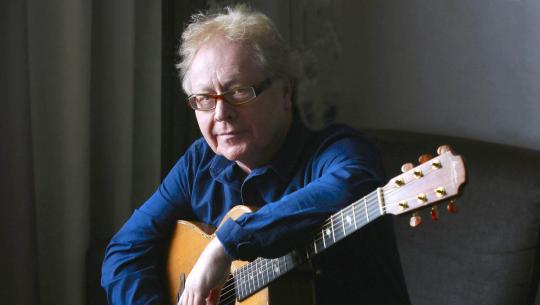
View On WordPress
5 notes
·
View notes